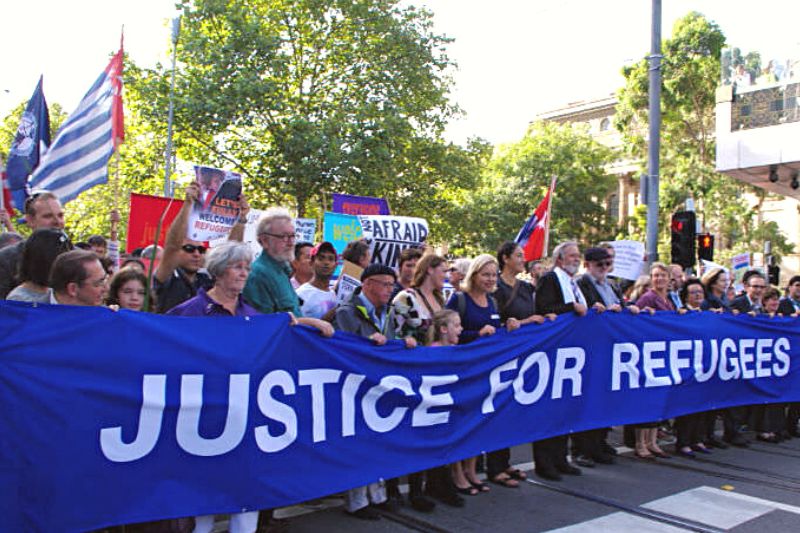Stories matter. Any group blessed with a story of an unwinnable campaign won and of a victory snatched out of defeat will continue to draw strength from it. The impossible battle won, the goal after the siren, the peaceful march that overthrows a dictator – such stories can continue to encourage people to hang together in the hardest of times.

The story of Easter is that kind of story. It begins with the shambles of Palm Sunday. A man preaches to the Jewish people that through him God is close at hand to bring forgiveness that will prove more powerful than sin. To prove his point he enters Jerusalem on a donkey, acknowledged by a handful of followers. The rest of the week is predictable. His enemies gather, the authorities watch, he is betrayed by one of his followers, disowned by the others, tried before the Jewish and Roman authorities, tortured and nailed to a cross as a deterrent to other would-be kings, with only military and a few women nearby. With him dies his cause.
Yet on the anniversary of this entry to Jerusalem people of many religions and none gather to march through our cities in solidarity with refugees. Like the women at Jesus’ execution they are also few and to all appearances ineffectual. Over the thirty or so years of the marches refugees who come to Australia to seek protection have suffered increasingly more brutal treatment. They have been refused entry, been transferred to camps in other nations under a regime of systematic neglect and disrespect, suffered from mental and physical illness, and denied support within a wealthy nation. Australia has become a world-leader in brutality, copied by other nations to their citizens’ shame. Refugees throughout the world are hung on the cross. The marches seem futile, their cause lost, their supporters like the women standing by Jesus’ cross.
The Easter story, of course, did not end with the donkey ride, nor with Jesus’ death and burial. It comes to life again with the incredible news that his tomb is empty, that he has risen from the dead, and that he has appeared to his followers. Suddenly his claim that in him God is with his people, endures the worst brutality that people can inflict on one another, and promises a life more powerful than death, all makes sense. His disciples are filled with the courage and hope to share his vision whatever the cost.
This story of unlikely victory underlies the hope that inspires Christians to link the Palm Sunday March to the plight of refugees and to walk with them in hope. It is quixotic but powerful in its logic. It fully acknowledges the power of evil in the world which drives people out of their country, denies them hospitality and punishes them in order to deter others from seeking hospitality. Yet it refuses to be intimidated by such evil or to allow it to pass unchallenged because it recognises the wonder of Easter. It sees that in this death the love and compassion of a God who shared the consequences of evil are more powerful than the malice, pragmatism, anxiety and apathy that lead people to be complicit in torturing one another.
At Easter time in Southern Australia the autumn rains have usually turned fields and lawns green and revived small plants. Sometimes that rain has been sufficient to prepare the soil for planting. At other years it only introduces a green drought in which grasses, flowers and trees have no deep roots and will soon wither.
'Easter is a spur to continue through defeats and victories to live in solidarity with those who are excluded.'
By Easter this year it is still uncertain whether the Australian Government policy towards people who seek protection will revert to drought or will become deeply rooted in respect and compassion. The ministerial decisions to give shelter to individuals on compassionate grounds, the review of cases of people who have been detained for years, and the phasing out of Temporary Protection Visas with their arbitrary and cruel conditions, have been like summer showers. They refresh the ground and potentially weaken the hold that the brutal logic of deterrence has on refugee policy. But the water-repelling network of legislation, regulation, practices and rhetoric that govern the way in which people seeking protection are routinely treated remains. There is little evidence that the Government will have the political courage needed to dismantle it. Another harsh summer may well kill off the Easter growth.
The story of the first Easter accommodates such doubt. It does not promise that followers of Jesus will succeed in their attempts to change their society. It promises that if they follow Jesus ultimately they and the world will share Christ’s victory. Easter is a spur to continue through defeats and victories to live in solidarity with those who are excluded.
Andrew Hamilton is consulting editor of Eureka Street, and writer at Jesuit Social Services.
Main image: Palm Sunday Rally for Refugees